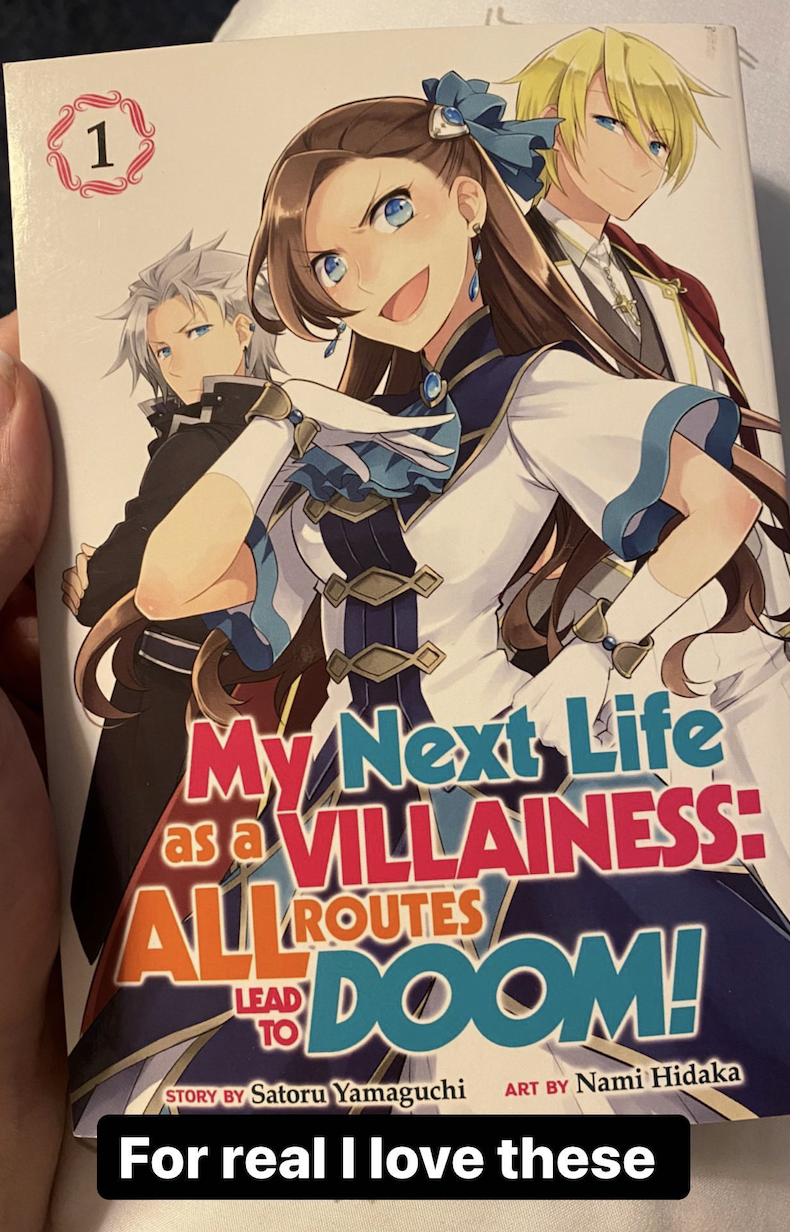Some spoilers and summary throughout!
A teenage girl in Japan passes away all too early in an accident. Fortunately, she is reincarnated - but, she’s reincarnated as the cruel, bullying villain in her favorite mobile phone game.
It’s a cruel parameter fable, maybe even more cruel than waking up as a giant beetle. Imagine waking up as Bowser from Mario games and seeing your hand is a big claw, your mouth fiery and ull of teeth. Knowing that the whole point of the game is for Mario kick your ass, what would you do?
As soon as the passed-away-and-reincarnated heroine realizes who she is, she knows that if she lives as the villain lived and is truly cruel and mean, she will be exiled or put to death at the end of the game (All routes lead to doom!). To avoid this fate, she strategies on how to live a life of good deeds, how to be a supportive friend, and overall, be a good person.
This Manga reminded me of “A Christmas Carol” where Ebeniezer Scrooge goes to sleep and is shown the foibles, mistakes, and cruelties of his past, his neglects of the present, and his dark, dark future by three ghosts. Tiny Tim in “A Christmas Carol” has an analogous character In My Next Life as a Villainess. In Dickens’ world of unshakeable class structures, whether Tiny Tim lives or dies is, sadly, not up to Tiny Tim or Tiny Tim’s parents. It’s up to the boss, it’s up to Ebeniezer Scrooge.
And it’s a bit similar in My Next Life as a Villainess, which is a tale about being a good person even if you get stuck with some bad luck, a spoiled upbringing, and a face that makes you LOOK villainous.
MNLAAV has reverse-harem genre aspects in addition to being a morality tale, and the book largely satirizes these, as Katarina is too dumb, too laser-focused on her good deed strategies to realize that through all of her good deeds, she’s started to attract most of the male characters and a couple of lady characters to boot. At least, this is true for volumes 1 through 5. Katarina changes, but she doesn’t have the change that Scrooge does late in the story.
Stories like A Christmas Carol and MNLAAV are morality tales for the powerful, or for those with moderate amounts of power. Scrooge is a businessowner, Katarina is the daughter of a duke. Even if they act averagely or like an average person, they won’t die horribly or end up in the fires of hell, but for some reason, somewhere along the way, both characters tilt towards greed and cruelty. For Scrooge, at the end of his life, there is the threat of the fires of hell. For Katarina, there is the fact that her bad deeds will catch up to her and she will either get killed or be exiled.
Ideally it wouldn’t be fateful endings that motivate the Scrooges and Katarinas of the world, but I personally will take what I can get in this regard. Dickens probably thought that if one person has a change of heart after reading A Christmas Carol, that’s a pretty good achievement in addition to all the other achievements of his work. While Dickens is often anecdotalized as a guy who wrote as much as he could for as much money as possible, it’s hard to look at Dickens and not see class and power as some of his main themes, themes which are carried onwards today in most countries and in formats like MNLAAV. Dickens really wanted to talk about class, even compactly, and My Next Life as a Villainess wants to do the same.
These aren’t bad messages for the powerful to absorb, or for people coming into power to heed. MNLAAV isn’t even a bad series of stories for the unpowerful. Compared to others, Katarina has laughably bad magical powers: all she can do is raise a tiny mound of dirt from the ground, while her peers cast fire spells and elemental magic straight out of Full Metal Alchemist.
Another thing that MNLAAV and A Christmas Carol have in common is that they aren’t the only morality tales of their time. There are other reverse-harem villainess stories out there, and there have to be dozens of other stories like A Christmas Carol that appeared around the same time Dickens was writing his work. It’s a bit as if every author writing about class in a modern economy throughout time is simply saying: “please stop being dicks, you guys”
Ultimately, both tales will work for a certain type of person regardless of their class - anyone who thinks they’re doomed because of something - the way they look, their income, whatever it is - such doom can be fixed if one simply has enough self-awareness to be good to those around them. If that isn’t a sweet message, regardless of holiday season, I don’t know what is.
